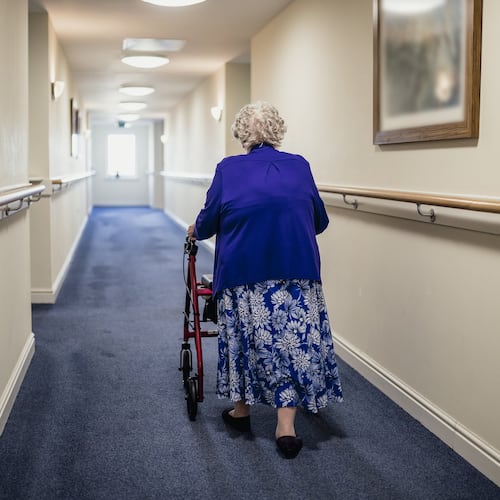Georgia’s senior care homes would face stiffer penalties for abuse and neglect and would have to meet more stringent staffing and training requirements under proposed legislation unveiled on Thursday.
The proposal comes as senior advocates and the public have raised concerns about the safety and state oversight of the fast-growing industry that serves thousands of elderly Georgians in assisted living communities and personal care homes.
State Rep. Sharon Cooper, R-Marietta, announced her bill in a news conference at the Capitol with a group of legislators, advocates and family members standing behind her in support of the legislation. Cooper, chairwoman of the House Health and Human Services Committee, noted that along with being a lawmaker she is also a registered nurse. “So, the patient is always my priority,” she said.
» SEARCHABLE DATABASE: Details on every facility studied by the AJC
» MORE: The 'Unprotected' investigative series
She said that while many homes do a wonderful job caring for frail, elderly people, some are falling short.
“Unfortunately, the bad ones put everybody into a bad situation where we need to make corrections,” she said. “The bill is a beginning in making those.”
At a time when the state’s elderly population is growing, the General Assembly needs to act quickly to pass the reforms, said Vicki Vaughn Johnson, chair of the Georgia Council on Aging.
“Georgia cannot afford to wait to fix problems in the assisted living industry,” she said. “The state must hold facilities accountable and it must inform consumers about problems that occur. The assisted living industry is too important to Georgia families to risk losing the public’s trust.”
Cooper said she worked closely on the bill with state Rep. John LaHood, R-Valdosta, who owns and operates assisted living homes. LaHood was among those standing behind Cooper in support of the bill, which was drafted in response to The Atlanta Journal-Constitution's investigative series last year that exposed widespread problems in the senior care industry. The proposal addresses many of the problems the AJC identified.
“I believe if you have adequate staffing and you have adequate procedures in place we can prevent a lot of the incidents that we have been reading about in the AJC,” Cooper said.
Gov. Brian Kemp later said that Cooper had also worked with his office and with the state oversight agency to craft solutions. “Georgia is a state that values life, and that means every senior citizen should be safe to age gracefully in their local community…,” he said. “I look forward to working with members of the General Assembly to pass this important legislation and continue to protect the elderly in Georgia.”
» RELATED: Advocates urge lawmakers to fund reform of senior care system
» MORE: As state struggles to protect seniors, agency mum on more inspectors
The AJC series, "Unprotected," revealed how a gold rush mentality to profit from aging seniors led investors to pour money into Georgia facilities, creating competitive pressures that caused some to struggle financially and care to suffer.
Currently, the state has no mechanism to track the financial stability of a facility. Cooper’s proposal would require these senior care homes to provide more financial information to regulators, including notice to the state and residents when a facility faces bankruptcy, a change of ownership or other disruptions.
The legislation also calls for increased fines when facilities run afoul of safety regulations or when someone dies or is seriously injured as a result of poor care. Most serious violations — including those involving a resident’s death — currently result in a $601 state fine, if a fine is issued at all. The proposal would impose a minimum fine of $5,000 for deaths or serious injuries linked to poor care. The maximum overall daily fine for violations would increase from $1,000 to $2,000 per day, with the total maximum fine going from $25,000 to $50,000.
Advocates for seniors heralded the proposed increased fines. "It's a huge step forward," said Melanie McNeil, who as the state's long term care ombudsman is a consumer advocate for residents in Georgia's licensed facilities.
Another section of the bill calls for more staff and additional training for caregivers at assisted living communities and large personal care homes. Currently, a minimum of one caregiver is required for every 25 residents at night. But, as the AJC revealed, many of the most serious injuries and problems occurred at night when workers said there wasn’t enough help to care for residents.
And with many residents in assisted living and personal care homes suffering from dementia or Alzheimer’s, facilities with memory care units would be required to have certification from the state. Georgia’s oversight agency for the senior homes currently doesn’t even keep a list of which ones have memory care units.
» RELATED: Audit finds state failing elderly victims of abuse, neglect
» OPINION: A path toward fixing Georgia's assisted living system
Memory care units also would be required to have at least one direct care staff member for every 12 residents at all times, and the employees would have to undergo additional training.
Improved staffing will provide “protection for residents and for staff,” McNeil said.
Administrators also would have to be better trained. The AJC found that 35 states set higher standards for managers than Georgia does. The bill would require administrators of facilities with at least 25 beds to undergo special training, pass a competency test and get licensed.
Cooper said the effort to better protect seniors also includes a bill sponsored by Rep. Chuck Efstration, R-Dacula, that will help make sure local coroners or medical examiners are notified of unexpected deaths in senior care homes.
LaHood said he and other providers have a passion for caring for seniors and want good outcomes across the industry. “We want to raise the minimum standards to help to insure that families’ expectations are met, that residents are getting the care they need and they have a choice to age in place and understand what the risks are, and I think this bill goes a long way to accomplish that.”
Peggy Lavender, a retired teacher, urged the state to pass the bill Thursday, as she shared the story of what happened when she placed her husband, who had Alzheimer’s, in an assisted living facility that assured the family it could provide specialized care that Lavender’s husband needed. It became a “horrific 10-day experience,” Lavender said, prompting her to bring him back home until recently finding a new facility for him.
Thousands of Georgia families rely on private-pay assisted living communities and large personal care homes. To examine the quality of care they receive, the AJC reporters spent more than a year compiling and analyzing thousands of government documents and databases and conducting dozens of interviews. The investigation of Georgia's system revealed hundreds of cases of neglect and abuse, nearly two dozen deaths and dangerous gaps that leave vulnerable seniors unprotected. The legislation proposed this week by Rep. Sharon Cooper, R-Marietta, is patterned after many of the problems highlighted by the AJC's reporting.
Five key proposals for improving safety and oversight of Georgia’s assisted living and large personal care homes:
- More staff would be required in memory care centers at all hours; minimum staffing requirements at night would increase outside of memory care.
- Assisted living communities would have to have an RN or LPN on site for a set number of hours, based on the number of residents.
- Facilities would be required to disclose financial information and notify the state and residents when they face bankruptcy or ownership change.
- Administrators would have to pass a test and be licensed.
- Fines for neglect and abuse would increase. The minimum fine for death or serious injury linked to poor care would be $5,000.
The Latest
Featured






